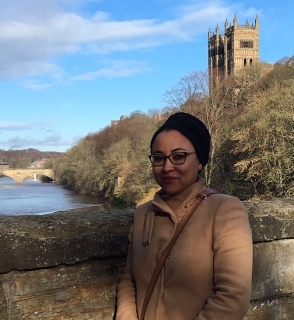Staff profile
Sufia Singlee

| Affiliation |
|---|
| Member of the Durham Law School |
Biography
Doctoral candidate, Durham Law School
Contact Sufia Singlee (email: sufinnah.singlee@durham.ac.uk)
Twitter account: @sufiasinglee
(Link to PhD Project webpage here)
Sufia Singlee is a doctoral candidate at the University of Durham. She is a recipient of a PhD studentship from the University’s newly established Global Challenges Research Fund (GCRF) Centre for Doctoral Training (CDT).
Summary of doctoral project:
Expanding the reach and influence of formal labour standards to a growing proportion of workers in the global economy, particularly in lower and middle income countries, is one of the central challenges confronting the labour law discipline. Recent research has, however, highlighted ‘institutional dynamism’, that is, the capacity of labour regulations to, firstly, extend beyond their formal parameters in ways that influence informal work relationships; and secondly, interact with other labour market institutions in ways that lead to improved pay equity outcomes for low-wage workers. How precisely the mechanics of institutional dynamism work is unclear and unstudied. The doctoral project therefore investigates the potential for dynamic effects of the recently enacted South African National Minimum Wage Act, 9 of 2018 (NMWA). By employing both doctrinal and interdisciplinary methodologies, as informed by behavioural economics and regulation theory, the thesis will investigate the following research questions:
- To what extent is the NMWA having dynamic effects in informal work settings, where levels of statutory inspection and enforcement are negligible?
- Does the NMWA interact with other labour market institutions within the wage determination framework and, if so, to what extent?
- What strategies are being adopted by the relevant stakeholders to extend the influence of the NMWA in both these settings?
- Which strategies have proven effective in ensuring compliance with the NMWA?
- Which strategies have proven effective in producing positive pay equity outcomes, particularly for low-wage workers?
- How can the dynamics effects of the NMWA be enhanced and harnessed for policy objectives?
Sufia’s research is associated with the project on Decent Work Regulation, led by Professor Deirdre McCann. The study aims to contribute to labour market policy debates on effective labour regulation, thereby furthering Goal 8 of the United Nations’ Sustainable Development Goals on decent work and economic growth.
Biography
Sufia received both her LLB and LLM (in Labour Law) from the University of Cape Town in South Africa and her LLM (in Human Rights and Social Justice) from the University of New South Wales in Australia. She is a member of the Institute for Development and Labour Law at the University of Cape Town (South Africa), PescaDolus (an independent research and fisheries crime network), as well as the Durham Human Rights Centre at Durham Law School.
The GCRF College of Doctoral Training is supporting more than 20 students working on a specific challenge in one or more of the areas associated with the UN Sustainable Development Goals with all PhD students coming from a DAC nation. All CDT PhD projects are interdisciplinary and collaborations with universities in DAC countries.
Sufia is currently on a leave of absence from the University of Cape Town where she teaches both labour law and business law.
Research Interests
Labour law
Law and development
Human rights and social justice
Immigration law
International law

